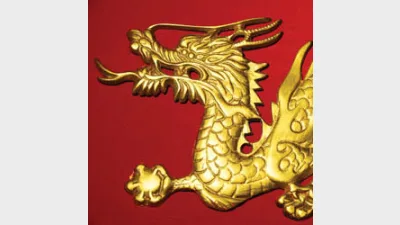Australia's investor focus shifts to China



With the Australian share market showing signs of strength, Janine Mace explains why the focus has shifted from the US to that of the Chinese economy.
While the Australian share market has traditionally taken its lead from Wall Street, these days it is also keeping a close eye on events in Beijing.
According to Schroders Investment Management’s head of Australian equities, Martin Conlon, China is increasingly moving centre stage when it comes to the economic outlook for Australia.
“The ability of the Australian economy to avoid the downward gravitational
pull of imploding Western economies has provided strong evidence that economies such as the US and Europe are now far less relevant to Australia’s outlook,” he says.
This view is echoed by Lonsec in its March Quarter 2010 Investment Insight.
“The US economy is now less relevant to Australia than in the past but investor sentiment is still driven by the US lead. It seems that if Australia’s future is increasingly tied to the developing economies of Asia, the US lead will become increasingly irrelevant,” it notes.
“China and broader Asia will become increasingly important to the Australian economy in terms of trade and capital flows.”
With the International Monetary Fund forecasting the Chinese economy will grow 8.5 per cent over 2010, any reduction in this level of growth will have significant implications for the Australian economy and share market.
“Any faltering in China’s growth path would exacerbate the risk to export income,” Lonsec points out.
Perpetual’s head of investment markets research, Matthew Sherwood, believes the future performance of many Australian stocks is now tied to the performance of the Chinese economy.
“Australia has more exposure to the Chinese economy than almost any other economy, so the developments there are vital,” he explains.
Although most experts believe Australia’s close trade links to China are ushering in a new ‘golden era’ of growth, voices of concern are being raised about the so-called China miracle.
A controversial analysis of China by Pivot Capital Management, China’s Investment Boom: The Great Leap into the Unknown, focuses on Chinese capital spending and concludes it “will not be sustained at current rates and that the chances of a hard landing are increasing”.
The report argues there will be a Chinese investment slowdown during 2010 as it has reached “an impasse in terms of its dependency on capital spending to generate growth”.
Conlon is another with questions about a steady continuation of Chinese growth.
“Very few are considering the risks to Chinese growth and the likely impact of a sharp slowdown,” he says.
“When so few question why Chinese growth is sustainable, our level of concern rises, as the risks to the value of investments which are premised on this assumption being true are unlikely to be adequately considered.
“We have questioned the sustainability of growth in the Chinese economy in the past as extreme reliance on fixed investment together with the increasingly dubious quality of investments would normally be reason for concern,” he says.
Sherwood agrees this is an issue Australian investors need to at least consider. “If a recession was to occur [in China] — and I don’t think it will — it would have a major impact here.”
However, he believes the longer-term outlook is bright. “China has some structural issues to deal with, but its growth profile is very strong. I don’t think there are too many downside risks to the economy.”
Recent moves by the Chinese Government to reign in its credit markets are a positive for the long-term growth of its economy, Sherwood says.
“They are not going to be a growth killer and are about excess liquidity, so these are all positive things and show the Chinese are continuing to manage their economy.”
Legg Mason chief investment officer of Australian equities Reece Birtles also views the announcement by the Chinese Government as a positive one.
“China grew its credit strongly in 2009 to stimulate its economy, so it is likely that it will have to normalise that,” he says.
“Credit growth was a lot compared to the size of their economy, so that needs to be unwound without affecting the economy too much.”
However, he acknowledges the decision will affect Australian companies.
“The removal of the stimulus has to flow on to the construction sector and that will impact demand for Australian raw materials like iron ore,” Birtles says.
Risks for resources
The resources sector has been one of the major beneficiaries of the economic growth occurring in China and — together with cyclical stocks — it has led the Australian market rally since March 2009.
However, this great performance is not without its risks. As Paul Winter, an equity strategist for PRV’s investment manager, Investors Mutual Limited (IML), notes, “Pinning our economy to China comes at a price”.
Although demand from China has remained strong and local resource companies have been able to maintain production levels, this is unlikely to continue, with China seeking to cool its economic stimulus, according to Winter.
“We believe this will mean a slowing in demand for resources over 2010 and as a result prices will come off. Of course, with resource stocks making up almost 40 per cent of the Australian stock market, this will mean a bumpy ride,” he says.
The Pivot Capital analysis echoes these concerns. “Anything that is cyclical and dependent on Chinese investment demand would obviously be the most vulnerable to a Chinese growth disappointment,” it notes.
This dependency also raises longer-term concerns about the growth and profit performance of Australian resources companies, according to Hyperion Asset Management's managing director, Dr Manny Pohl.
“The big risk is that China gets bigger and stronger. Over time the Chinese will flex their muscles as the biggest buyer in town and they could then become the price maker rather than a price taker,” he worries.
“China is a growth economy, but we need to be careful we are not being played as part of a long-term strategy.”
In the shorter-term, even without a major slowdown in the Chinese economy, Conlon believes the resources sector is unlikely to repeat its performance over the past decade and provide “the engine of investor returns” for Australian investors.
“The continuing strong run in gold and commodities has left us in a situation where we can see little value in most resource stocks in the absence of commodity prices staying elevated for an extended period,” he says.
“While prices have recovered sharply, the evidence of demand recovery is more difficult to uncover. Inventory levels in nearly all commodities are substantially higher than at the time prices were last at these levels, and investment, rather than consumer demand, seems to be a major factor.”
The recent market pullback has underlined the caution IML senior portfolio manager Hugh Giddy has felt about the resources sector for some time.
“There were early warning signs such as high stockpiles and a significant decline in freight rates, yet the speculative hot money continued to indiscriminately chase the sector,” he says.
“It is not a sector we will be rushing into given that the global growth outlook remains fragile.”
Recommended for you
Marking off its first year of operation, Perth-based advice firm Leeuwin Wealth is now looking to strengthen its position in the WA market, targeting organic growth and a strong regional presence.
Financial services software firm Iress has unveiled a new business efficiency program with the aim of permanently lifting its profit margin as the business enters a leaner, growth-focused phase.
AUSIEX has revealed the top traded stocks for October, noting significant jumps in advised investor trading, while ETFs also reported higher activity.
The Financial Advice Association Australia has implored advisers to reevaluate their exposure to AML/CTF obligations ahead of new reforms that will expand their compliance requirements significantly.










